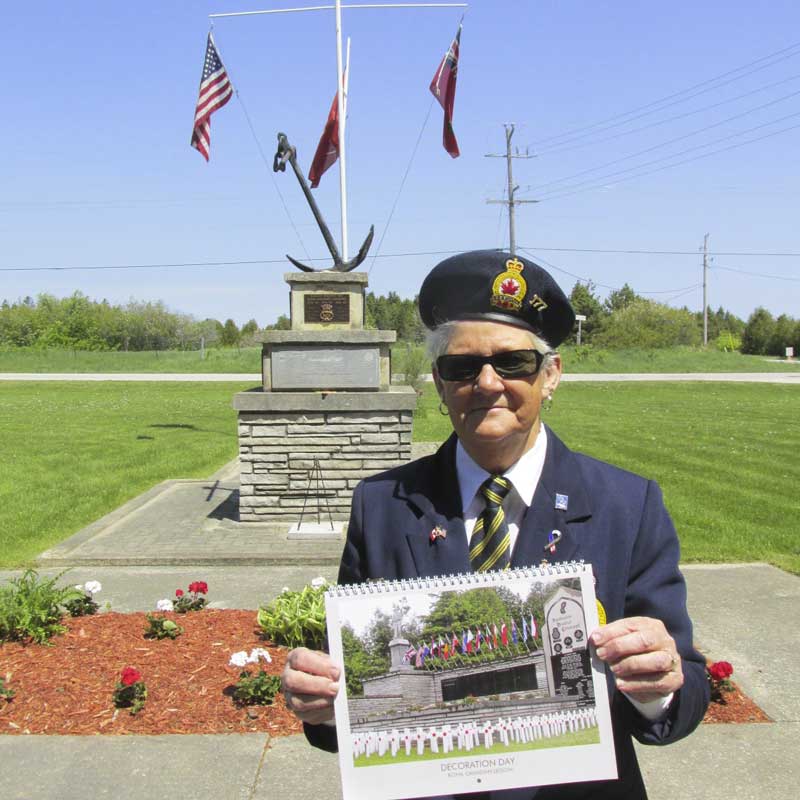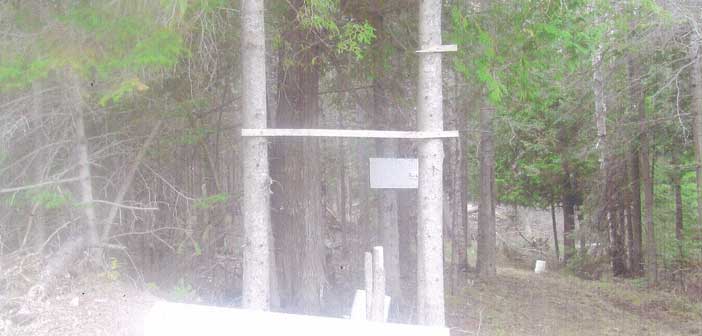EDITOR’S NOTE: The following essay was originally presented by Rick Nelson, curator of the Old Mill Heritage Centre, on Remembrance Day 2009 in Kagawong. It has been revised to coincide with the 70th anniversary of D-Day.
by Rick Nelson
With this week marking the 70th anniversary of D-Day, I would like to mark the occasion by daring to speculate on what might have been.
Seventy years since the landings on those beaches, time has given us the opportunity to reflect on what kind of world evolved from that turning point in the Second World War. Do we reflect mostly on the victory? What would it have been like if victory at Normandy had not been achieved?
The war that began in September 1939 had been dragging on for five years. Hitler’s hopes for a quick war and a defeated Britain had evaporated. The British remained free to carry on, had air superiority and now had some powerful allies. Canada had been there from the beginning but now the Brits had countries like the United States and the Soviet Union. England’s ability to remain independent and its close proximity to the European mainland made it the perfect launching platform for the liberation of Europe and achieve the eventual defeat of Nazi Germany. Everyone (including the enemy) knew an invasion was coming, but no one knew for sure how it would really play out.
The planning had been in the works for more than a year now. codenamed Operation Overlord. For it to work, the first stage of the operation required 160,000 troops to overwhelm the German defenses along the Normandy coast, and they had just one day to do it or risk a devastating counter assault.
On the night of June 5, 1944, and just hours before the D-Day invasion, General Dwight D Eisenhower, Supreme Allied Commander of all the forces involved in the upcoming invasion, wrote a speech he prayed he would never have to make. He wrote: “Our landings have failed to gain a satisfactory foothold and I have withdrawn the troops. My decision to attack at this time and place was based on the best information available. The troops, the air and the navy did all that bravery and devotion to duty could do. If there is any blame or fault attached to the attempt…it is mine alone.”
As we all know, D-Day was a success and General Eisenhower never had to deliver that speech. However the fact that he wrote it and was prepared to read it indicates that the success of D-Day was no sure thing.
Everything depended on the element of surprise. Although Hitler knew the invasion was coming, the trick was to keep him guessing where or when it would take place. Looking back, we know now that an elaborate deception campaign convinced Hitler that the main thrust of the attack would occur at another location along the French coastline and he ordered that area be fortified with as much firepower as possible. If the Germans had known in advance that Normandy was the location for the allied invasion, they would surely have brought to bear all of their forces and firepower there for use, just as our troops were landing on the beaches.
The weather was another factor in the success of the mission. The invasion had been scheduled 24 hours earlier for the morning of June 5, but the weather situation over the English Channel was horrendous and operations had to be postponed. The moon and the tides over the channel were favorable for only a couple more days. After that, conditions would not permit operations to begin for another two weeks.
Any further postponement would have risked the Germans finding out where the invasion was to take place. Fortunately, a temporary break in the weather allowed the invasion to go ahead on the 6th of June. A 5,000-vessel armada, the largest ever assembled and stretching as far as the eye could see, transported both men and vehicles on the 100 mile journey from the secure shores of Britain across to the French beaches of Normandy and…uncertainty.
All reports indicate the enemy was taken completely by surprise. However, the landing on the beaches of Normandy that day was no walk in the park. Just because Hitler wasn’t expecting the invasion to come to Normandy doesn’t mean the defenses there were weak.
In order to counteract this problem, the landings were preceded with naval bombardment of German fortifications. Alan Tustian of Mindemoya was on a ship that patrolled the English Channel, protecting the invasion fleet from enemy submarines. Airbourne assaults took place along with parachute drops to seize bridges, rail lines and road crossings to cut off German counter attacks.
The beach landings took place along a 50-mile stretch of the French coastline divided into five sectors: Utah, Omaha, Gold, Sword and the Canadian sector of Juno. There were 10,000 allied casualties that day, almost 1,000 of those Canadian.
If anyone has watched the movies ‘The Longest Day’ or ‘Saving Private Ryan,’ it gives you a sampling of what happened when the troops came ashore. They were mowed down with machine guns by the hundreds as they left their landing craft. At Juno Beach the first wave of Canadians took 50 percent casualties. But by nightfall, over 100,000 allied troops had made it ashore and sought to secure the French coastal villages. By now, word was spreading all over the world that the D-Day invasion had begun. George Boyd of Kagawong heard the news from the radio room while on convoy duty in the North Atlantic. By July 1944, some one million Allied troops were entrenched in Normandy. It is considered the decisive battle of the war in Western Europe.
But what if the Germans had been tipped off? What if the Allies had been walking into an ambush? What if D-Day had failed? What if? To speculate means to offer an opinion. Some military students and historians suggest that if D-Day had failed, it might have taken the Allies at least a year to regroup in order to launch another invasion of that magnitude. Meanwhile Hitler would have had more time to develop new technology to improve the striking power of his U-boats, along with the development of jet aircraft. The V-1 and V-2 buzz bombs would have continued to hammer Britain with increasing numbers. The Nazis may have had time to acquire even more devastating weapons of mass destruction.
Eventually, though, Germany would have been defeated, for its fate had already been sealed with their losses on the Russian front. But the world would have looked much different with an Allied defeat at Normandy. The Soviet Union’s Red Army was now on the offensive in Eastern Europe. In effect, it meant replacing one totalitarian empire with another. Unchecked and without the counter balance the D-Day invasion forces and manpower provided, the Soviets would likely have increased their territorial conquests.
This year marks the 25th anniversary of the fall of the Berlin Wall. A wall that the Soviet sponsored state of East Germany built to keep their people in and shot anyone who tried to climb it. It took 45 years after the D-Day invasion to see the collapse of that wall with the eventual downfall of Soviet Union. What would that outcome have looked like had the landings on those Normandy beaches not been successful? Complete domination of Europe by an even more powerful Soviet Union would have not have been very pleasant, especially with the development of atomic weapons.
As it turned out, the world was dangerous enough following the Second World War. Just ask our Cold War vets. The next generation of Canadian veterans, like Peter Fletcher from Gore Bay, spent months up at CFB Alert, our most northern outpost in the Arctic monitoring Soviet military radio traffic. That outpost might have been the first to be hit in a Soviet attack on North America. Ron Young from Otter Lake served aboard Navy ships constantly searching out Soviet submarine activity in the North Atlantic. He and his crewmates were potential sitting ducks from these underwater threats if the cold war suddenly turned hot.
How would things have shaped up in the Korean conflict, with a Soviet-backed North Korean regime? Would the outcome still have been a stalemate if the Soviets had more muscle to flex?
All hypotheses are debatable, of course, but it is chilling to look at what the stakes were like in June of 1944. It was a heavy burden for the brave soldiers, sailors and airmen of the allied expeditionary force to bear, 70 years ago. But they got the job done. Here’s an excerpt of the speech General Eisenhower did get to make. “You are about to embark upon the Great Crusade. The eyes of the world are upon you. The hope and prayers of liberty-loving people everywhere march with you…the tide has turned!”
To all the soldiers of Manitoulin Island who helped turn that tide, and to all the brave men and women from that “Greatest Generation” who saved the world, thank you so very much.





